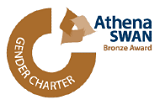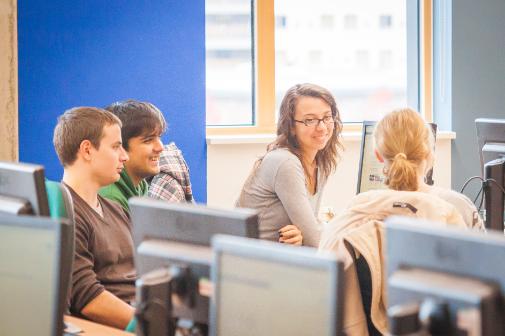
Preparing for postgraduate study
Introduction

To help you make the transition from undergraduate to postgraduate study, we've put together some resources which we hope you will find useful.
We have links to the University's welcome guides for new students, tips on brushing up your skills, and recommended reading.
Will you be joining us this year? Congratulations! In early September, we will provide more information about induction sessions and social activities which will take place in your first week. The aim of these sessions is to help you settle into life as quickly as possible.
Questions? Contact us! Email us at cs-pgt-admissions@york.ac.uk and we'll be happy to help.
Preparing for postgraduate study
To support your transition to postgraduate study, the University of York has created a Welcome guide with lots of information including helpful checklists and induction material. If you are an international student, there is an additional guide to help you get ready for your study at York.
Please take some time to read these guides, as they will help you prepare fully for your studies at York.
Preparing for Computer Science at York
We're often asked by new students whether there is any preparatory reading that can be done before joining us here at York. We've put together reading lists for each of our Masters courses: we don't expect you to have read all the publications recommended for your course by the time you start, but we do recommend that you explore as much of the material as you can in your first few weeks.
Preparatory reading for MSc Advanced Computer Science
If your mathematical skills have been put to one side for a while, then we strongly recommend that you refresh these before your start your masters course at York. Take a look at Units 1 and 2 of Khan Academy's linear algebra course. You'll also find it useful to look at the online book Calculus (Gilbert Strang, MIT), sections 2.1-2.3 and 3.2-3.3.
The easiest way to refresh your programming skills is to work through a Python tutorial. A good interactive online book is Think Python: How to Think Like a Computer Scientist (Allen B Downey, 2nd Edition, version 2.4.0), which teaches core ideas and terminology, as well as Python skills. Another valuable reference is The Python Tutorial.
We also recommend you get up to speed with fundamental data structures and algorithms: to revise your skills in this area, take a look at Unit 1 of Khan Academy's computer science course.
Preparatory reading for MSc in Artificial Intelligence
We're excited to be teaching this new course from September 2023!
If your mathematical skills have been put to one side for a while, then we strongly recommend that you refresh these before your start your masters course at York. Take a look at Units 1 and 2 of Khan Academy's linear algebra course. You'll also find it useful to look at the online book Calculus (Gilbert Strang, MIT), sections 2.1-2.3 and 3.2-3.3.
The easiest way to refresh your programming skills is to work through a Python tutorial. A good interactive online book is Think Python: How to Think Like a Computer Scientist (Allen B Downey, 2nd Edition, version 2.4.0), which teaches core ideas and terminology, as well as Python skills. Another valuable reference is The Python Tutorial.
We also recommend you get up to speed with fundamental data structures and algorithms: to revise your skills in this area, take a look at Unit 1 of Khan Academy's computer science course.
Preparatory reading for MSc Cyber Security
The MSc in Cyber Security teaches a wide range of Cyber Security skills. In order to maximise the security content, we assume that you already have a background in computing and networks, and have some practical skills that will allow you to carry out a project in Cyber Security.
Computing
You will need to write programs in any current programming language (eg Java, Python, C/C++, C#) and understand how files are organised and structured in a modern operating system.
The easiest way to refresh your programming skills is to work through a Python tutorial. A good interactive online book is Think Python: How to Think Like a Computer Scientist (Allen B Downey, 2nd Edition, version 2.4.0), which teaches core ideas and terminology, as well as Python skills. Another valuable reference is The Python Tutorial.
Networks
In order to understand how network attacks work and how they can be detected and mitigated, you need to understand standard network protocols such as HTTP, TCP/IP, ARP and DNS.
You need to know what is usually covered in an undergraduate computer course. To help you decide if you need to do some reading in advance, we provide a detailed reading guide in PDF format which includes some questions that you should be able to answer. (If you can answer the questions without doing the recommended reading, then you already know enough!)
Preparatory reading for MSc Human-Centred Interactive Technologies
In order to give you some pre-arrival guidance for your course, we recommend that you explore the following resources:
- Norman, D A. The Design of Everyday Things. MIT Press, 2013 (Revised and expanded). A book to be read by anyone who ever designs anything, or uses anything that has been designed.
- We recommend that you watch this TED Talk by Don Norman: 'Three ways good design makes you happy'
- Rogers Y, Sharp H and Preece J. Interaction Design: Beyond Human-Computer Interaction. Wiley, Sixth edition, 2023. This book clearly illustrates the approach we take to Human-Computer Interaction, and one which will be referred to in several modules.
- Lazar J, Feng JH, Hochheiser H. Research Methods in Human-Computer Interaction. Morgan Kaufmann, Second edition, 2017. Provides excellent coverage of a range of methods used in HCI research.
Preparatory reading for MSc Safety Critical Systems Engineering
Face to face teaching for this module will start on Tuesday 26 September 2023. Please check your email for instructions on how to join this module: this information will be sent to you before the start of term.
Your first module is Foundations of System Safety Engineering (FSSE). Your course leaders will send out preparatory materials for this module on Monday 18 September 2023 via the Yorkshare VLE (Virtual Learning Environment). It is essential that you work through these materials before teaching starts.
Advice about computers
The Department has a dedicated software lab for Masters students which is available to our students 24 hours a day, 7 days a week. Our lab PCs are set up with all the software needed for teaching and assessments, and are upgraded on a regular basis by our specialist in-Department team.
Many students have their own PCs or laptops and we know students may prefer to use their own machines. Some find laptops more practical; others prefer to have a desk-top PC - the choice is yours.
To support your studies in the Department of Computer Science, a laptop or PC with at least 500GB hard disk is ideal, as it enables you to dual boot Windows and Linux if you wish. 8GB RAM is a minimum and i3 is the minimum processor to go for. We recommend an SSD as the performance will be much better.
While we don’t teach anything that has Mac-specific software, you can buy a Mac laptop if you prefer. All our teaching is in Linux and Windows, so most applications will either have a Mac version or will compile in macOS. You can dual boot Windows and macOS using Boot Camp and we can provide some software in Windows if you need it.
Purchasing your computer:
- Further information about the recommended PC specification for taught students
- Student discounts and preferred suppliers
Follow us
Frequently asked questions
When you start your studies at York, you'll no doubt have lots of questions!
We've pulled together the answers to questions that are most frequently asked by our new students. Of course, if you can't see the answer to your question here, then contact us at cs-pgt-admissions@york.ac.uk, and we'll be happy to help.
